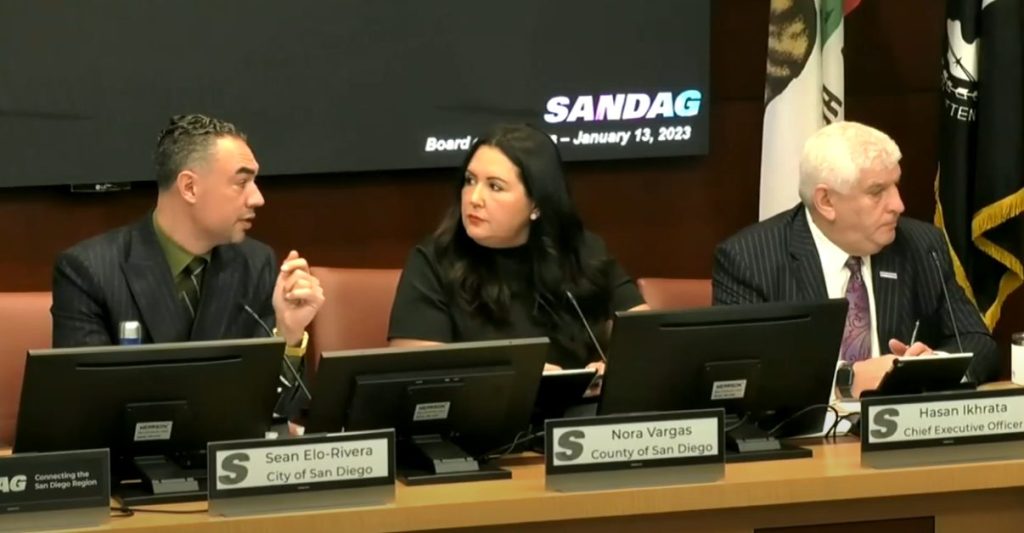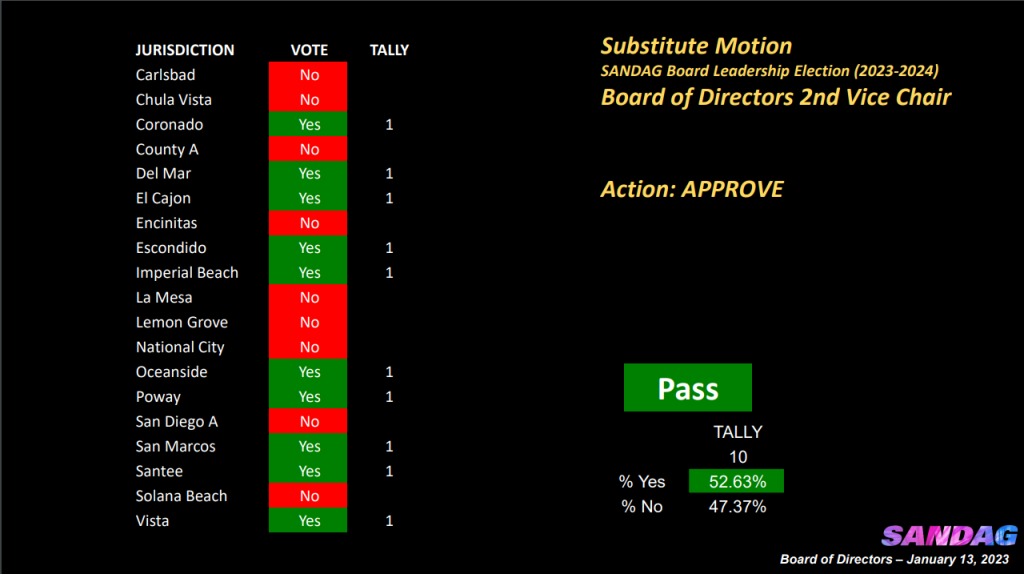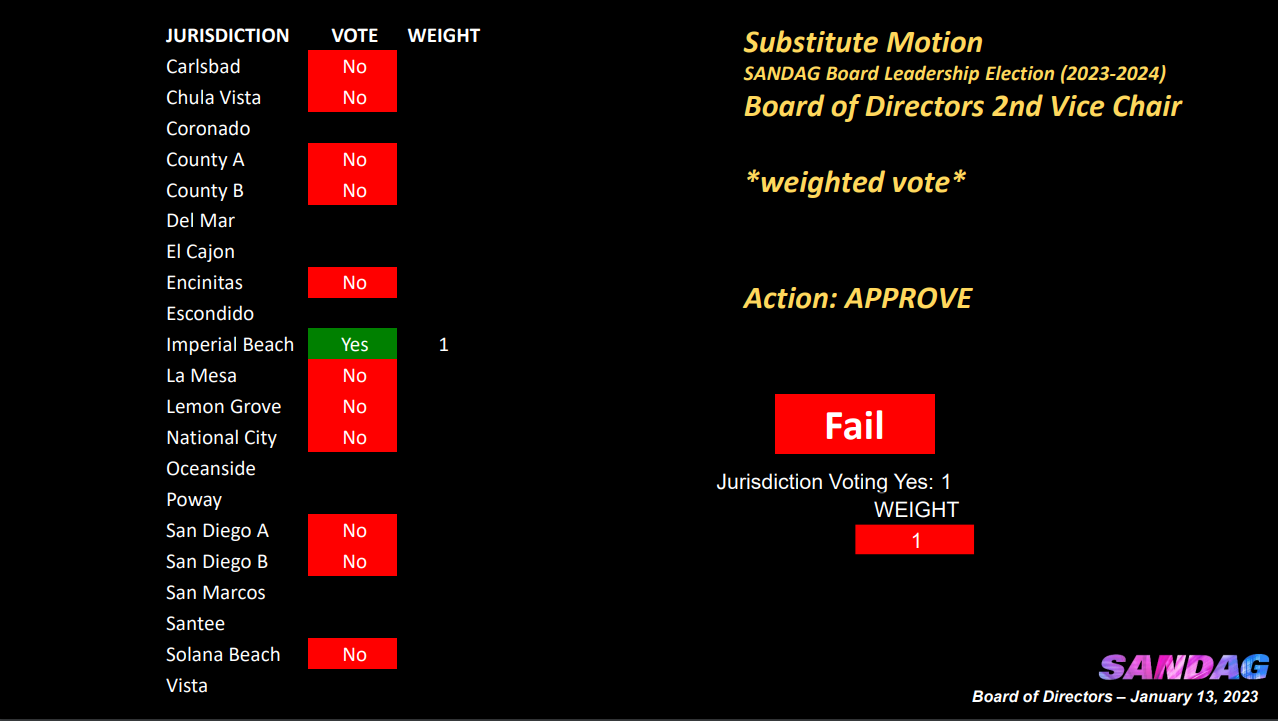
A motion was called, a vote was held, the motion failed. So the chair called for a weighted vote, and in response, nearly a third of the commission stormed out in protest. Under the weighted vote, the motion passed.
The drama unfolded as the San Diego Association of Governments voted on new board of directors leadership at its first meeting of the year. After the board appointed two Democrats from the region’s two largest jurisdictions to the board – County Supervisor Nora Vargas as chair and San Diego City Council President Sean Elo-Rivera as vice chair – a motion was made to install Del Mar Councilmember Terry Gaasterland as second vice chair.
She won by tally vote, so Vargas called for a weighted vote – and that’s when nine representatives from small cities walked out.
“(This) is essentially a legislative tantrum that was just thrown in opposition of our responsibility to govern,” Elo-Rivera said, after the board continued its voting and appointed Solana Beach Mayor Lesa Heebner as second vice chair. “The idea that we’re going to throw a fit and walk out of meetings if we think that things aren’t going to go our way is not how democracy’s supposed to work.”


On one side, smaller cities in San Diego say they aren’t heard on the board because the weighted vote gives all the power to larger cities. On the other, commissioners argue that cities with higher populations deserve more power so the board better reflects the county’s majority needs.
“To use a weighted vote to override a negative tally vote,” resident Camilla Rang said during public comment at a Jan. 27 board meeting, “is fundamentally undemocratic and likens a dictatorship.”
But, supporters point out, the larger jurisdictions are representing more people. “This is about proportional representation,” Elo-Rivera said. “I do not believe that the residents of Del Mar are 350 times more important than the residents of San Diego.”
SANDAG has been voting under the controversial weighted vote system since 2017, under Assembly Bill 805. It’s similar to the U.S. Electoral College: the board’s 21 members cast votes weighted on their number of constituents. San Diego, for example, has two members carrying 21 votes each, while Coronado gets one.
The city of San Diego’s 1.3 million population comprises 41% of the region’s total population – the majority on the board. San Diego County is second, with 15% of the region’s population. Coronado’s population is less than 1% of the overall regional population.
Last year, Coronado and three other one-vote cities lost a lawsuit against SANDAG, alleging that the weighted vote unfairly shouldered them with more of the Regional Housing Needs Allocation than they can handle. Coronado is still out of compliance with the 912 additional housing units it must zone for under the RHNA.
In addition to housing allocations, SANDAG makes transit choices for the region, and different jurisdictions retain different priorities when it comes to public transportation and roadway improvements.
Ahead of the Jan. 13 meeting, representatives from 10 jurisdictions sent a joint letter to the board demanding the weighted vote be discussed. Coronado, Del Mar, San Marcos, Poway, Imperial Beach, Oceanside, Vista, Escondido, El Cajon, and Santee signed. While the weighted vote is a state law, not a SANDAG policy, board members questioned the interpretation of the law and when the weighted vote was appropriate.
The matter did not make it to the agendas at either January meeting, and its Feb. 10 meeting was canceled, though it was discussed thoroughly during public comment at both January meetings.
“The weighted vote is not about silencing others or a form of totalitarianism,” said Jesse Ramirez, community engagement manager at the City Heights Community Development Corporation. “It is about one thing and one thing only: proportional representation. The fact that you live in Del Mar or San Marcos should not mean that, as a person, you have more power within this agency. The voices of the people of San Diego matter just as much as the rest of the county.”
Ramirez and several of his colleagues cited SANDAG’s Youth Opportunity Pass, a free transit pass for those under 18, as something that helped the City Heights and other communities. Ramirez said smaller cities would steer the board toward expanding freeways, not public transportation.
But Gaasterland cited that her constituents have very little bus access, and that traffic in Del Mar is increasingly problematic. Instead of expecting such a geographically large region to end all car use, she argued, SANDAG should support cleaner methods of fuel as well as smaller, more efficient buses to incentivize residents in smaller cities to use mass transit.
Santee Mayor John Minto questioned why the board leaps to the weighted vote to pass items not approved by all jurisdictions.
“If we don’t have an agreement at the board level on some topic, why do we always have to jump to a weighted vote?” he asked. “Why can’t we take a step back, continue to negotiate, and find a collaborative solution?”
SANDAG voting was discussed at the February 7 Coronado City Council meeting:
RELATED:
Four Cities Appeal Court Ruling on SANDAG’S RHNA Allocation Process




